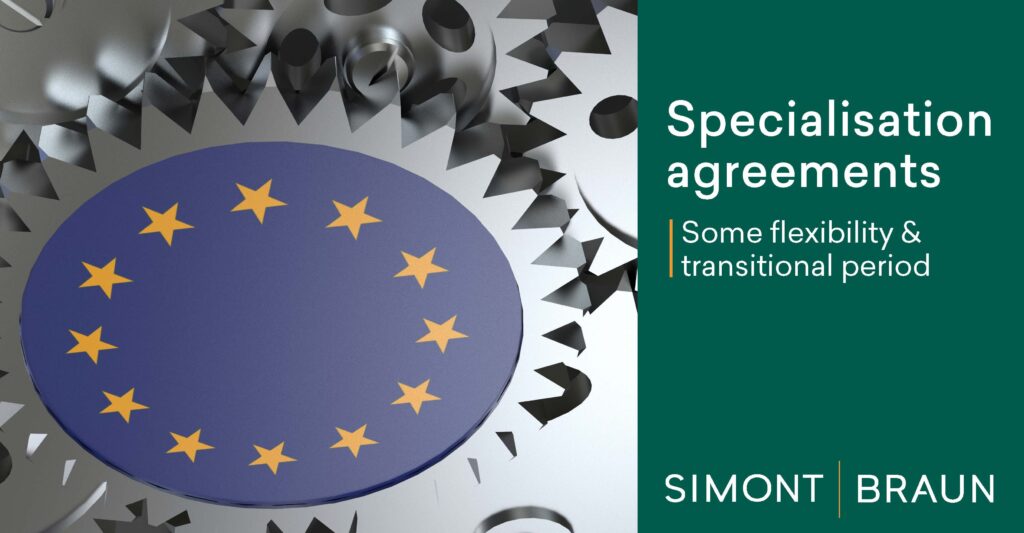Since 1 July 2023, a new regulation concerning the block exemption for specialisation agreements is in force (Commission Regulation 2023/1067 of 1 June 2023 on the application of article 101, §3 of the Treaty on the Functioning of the European Union [TFEU] to certain categories of specialisation agreements, OJEU, 2 June 2023, No. L 143). It replaces Regulation 1218/2010.

For the record, a block exemption regulation sets out the conditions under which a type of agreement between undertakings is exempted from the prohibition on restrictive agreements (Art. 101, §§ 1 and 3 TFEU). If an agreement does not meet these conditions, it is not necessarily prohibited and may still qualify for an individual exemption.
New guidelines (OJEU, 21 July 2023, No. C 259) provide guidance on the interpretation and application of Regulation 2023/1067.
Existing agreements that do not comply with this new regulation will have to be amended by 1 July 2025 if the parties want to continue to benefit from a block exemption.
THE BLOCK EXEMPTION AND ITS CONDITIONS
The new regulation exempts, under various conditions, certain horizontal specialisation agreements from the prohibition on agreements restricting competition (Art. 101, §1 TFEU). If these legal conditions are met, these agreements are presumed to meet the four conditions set out in Article 101, §3 TFEU for exemption from the prohibition.
In summary, in order to benefit from this block exemption, the combined market share of the parties may not exceed 20% on the relevant market(s) to which the specialisation products (manufacture of goods or preparation of services) belong; the case of intermediary products is subject to a new rule which also takes into account downstream products (Art. 3).
In addition, the agreement may not contain, directly or indirectly, in isolation or in combination with other factors under the control of the parties, hardcore restrictions (Art. 5). These, subject to certain exceptions, relate – as might be expected – to price fixing, restrictions on production or sales and the allocation of markets or customers.
MAIN CHANGES
Extension of the scope of the block exemption: the regulation applies to unilateral specialisation agreements, reciprocal specialisation agreements and joint production agreements. The definition of unilateral specialisation agreements (Art. 1, § 1, 1, a) also covers agreements concluded between two or more parties and in which one or more parties agree to cease production. By covering several parties, this definition, which has become parallel to that of reciprocal specialisation agreements and joint production agreements, has been broadened.
New market share threshold for specialisation concerning intermediary products: the regulation provides for a specific market share threshold in cases where the specialisation products are intermediary products that are fully or partly used captively by one or more of the parties as inputs for the production of downstream products, which they also sell ; in this case, the block exemption only applies if the parties’ combined market share on each of the relevant markets (intermediary products and downstream products respectively) does not exceed 20% (Art. 3, § 2).
Calculation of market shares: in principle, market shares are calculated on the basis of data relating to the preceding calendar year. The regulation now specifies that if these data are not representative of the parties’ position in the relevant market(s) (e.g. in the case of irregular demand), the market shares shall be calculated as an average of the parties’ market shares for the 3 preceding calendar years (Art. 4, § 1, b).
Simplification of the grace period: If the parties’ combined market shares are initially not more than 20 %, but subsequently rise above that level in at least one of the relevant markets, the exemption shall continue to apply for a period of 2 consecutive calendar years following the year in which the 20 % threshold was first exceeded (Art. 4(d)).
Individual withdrawal: the power of the European Commission and the National competition authorities to withdraw the benefit of the block exemption regulation where they find that the conditions laid down by the regulation have not been met, is now set out in the regulation itself (Art. 6 and 7).
ENTRY INTO FORCE AND TRANSITIONAL PERIOD
Regulation 2023/1067 came into force on 1 July 2023 and shall apply until 30 June 2035 (art. 9). However, a transitional period of two years is provided for in article 8: agreements already in force on 30 June 2023 which do not satisfy the conditions for exemption established by the new regulation but which satisfy the conditions for exemption established by the former Regulation 1218/2010, will continue to benefit from the exemption until 30 June 2025. Parties therefore have two years to comply with the new rules established by Regulation 2023/1067 if they want to continue to benefit from the block exemption.
For any questions or assistance, please reach out to our
Intellectual Property Team | IP@simontbraun.eu [1] – +32 (0)2 543 70 80
Download PDF version here [2]
***
This newsletter is not a legal advice or a legal opinion. You should seek advice from a legal counsel of your choice before acting upon any of the information in this newsletter.